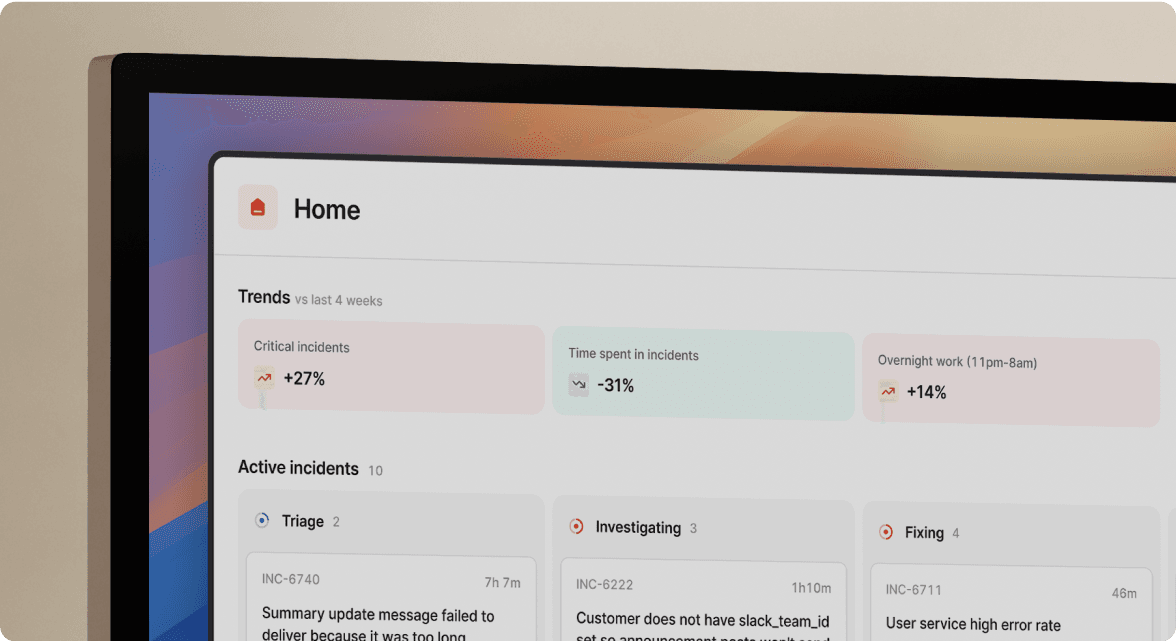Schedule incident debriefs in Outlook
January 21, 2025

After resolving an incident, organising a debrief is a valuable next step. This meeting allows everyone to discuss what happened and identify follow-up tasks to prevent similar issues in the future.
We've supported automatically linking debrief events with your Google Calendar for over a year, and now we're excited to announce Outlook Calendar support! You can link a debrief event to your incident directly from Outlook, ensuring everyone knows the timing and attendees.
To get started, install our Outlook integration. When you create an Outlook calendar event that includes the incident identifier (e.g. INC-123) in the title or description, we'll automatically attach it.

When you mark the meeting as a debrief, we'll share the details in the channel and automatically complete the ‘Schedule a debrief’ learning task for you.
Need help setting up the debrief? Select ‘Schedule a debrief’ from the incident homepage sidebar, and we'll create an event pre-filled with key members and incident links. Simply choose a time and click "save"!
Reusing the same Google Meet for debriefs
If you’re scheduling your debriefs with Google Calendar, you can now configure placeholders to specify whether debriefs created within a placeholder should reuse the placeholder's conference details.

This is particularly useful for customers where the placeholders are used to book meeting rooms rather than the debrief events themselves.
With this feature enabled, you’ll no longer need to manually re-setup the conference equipment to connect to the debrief call, but instead both debrief and placeholder calls are the same!
What else we’ve shipped
New
- An escalation path branch can now do nothing, which will cancel any escalation which lands on that branch
- Alert routes can now skip triage and go straight to an active status when creating incidents
- We'll now show the priority of the associated alert on an escalation message in Slack 💅 When creating an override or cover request on mobile, we'll now tell you the duration you've entered below the date inputs
Improvements
- If you try to resolve an alert from the dashboard which cannot be resolved manually, we'll surface an appropriate error
- We've tidied up the alert summary list in an incident if you are receiving many alerts to be less noisy
- We will automatically truncate incident names to 1024 bytes when they are created
- Cloudwatch alert URLs will now include the originating region to improve navigation
- If you opt out of using our mobile app to get paged, we'll tell you how to change your mind later
- Policies can now ignore incidents which opted out of the post-incident flow
- When filtered by incident type, the statistics table in the post-incident hub no longer includes rows for severities that are disabled for that type
- Improved how long Scribe will sit in a silent call before assuming it has ended
- If the setting to enforce a follow-up owner is enabled, we'll now default to assigning the incident lead when inferring follow-ups from post mortems
- Improve UI for editing multi-valued string attributes in an alert source
- When hovering over a schedule shift, we show the shift in all selected time zones
- Made it harder to create a custom field with a reserved name
- Improved editing experience for summaries with rich text
Bug fixes
- We no longer submit cover requests on mobile when you press the "Done" button on your keyboard
- Prevent components from overriding manually set subpages on a status page incident
- Show a helpful error message when uploading an invalid logo to a status page
- We now rate limit the frequency of new status page subscriptions
- Improved handling of links from Slack that don’t have any text associated with them
- Searching for an alert source or route in Firefox no longer loses focus every few characters
- Fixed timezone issue when calculating trends in Insights
- Fixed issue with multi-selection on certain custom dashboards for Insights
- Fixed formatting of alert descriptions in incident summaries
So good, you’ll break things on purpose
Ready for modern incident management? Book a call with one of our experts today.

We’d love to talk to you about
- All-in-one incident management
- Our unmatched speed of deployment
- Why we’re loved by users and easily adopted
- How we work for the whole organization



